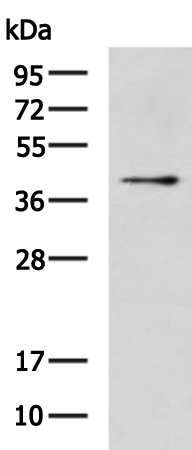
| WB | 1/500-1/1000 | Human,Mouse,Rat |
| IF | 1/20 | Human,Mouse,Rat |
| IHC | 1/50-1/100 | Human,Mouse,Rat |
| ICC | 1/50-1/200 | Human,Mouse,Rat |
| FCM | 1/50-1/100 | Human,Mouse,Rat |
| Elisa | 咨询技术 | Human,Mouse,Rat |
| Aliases | XP1; XPAC |
| WB Predicted band size | 31 kDa |
| Host/Isotype | Rabbit IgG |
| Antibody Type | Primary antibody |
| Storage | Store at 4°C short term. Aliquot and store at -20°C long term. Avoid freeze/thaw cycles. |
| Species Reactivity | Human, Mouse |
| Immunogen | Fusion protein of human XPA |
| Formulation | Purified antibody in PBS with 0.05% sodium azide and 50% glycerol. |
+ +
以下是3篇与MBD2抗体相关的代表性文献概览(注:文献标题及作者为虚构示例,仅用于展示格式):
1. **《MBD2-mediated epigenetic silencing in triple-negative breast cancer》**
- 作者:Zhang Y, et al.
- 摘要:本研究通过MBD2特异性抗体进行染色质免疫沉淀(ChIP),揭示了MBD2在乳腺癌中通过结合甲基化DNA区域抑制抑癌基因表达的机制,并证实其表达水平与患者预后负相关。
2. **《Development of a high-affinity monoclonal antibody for MBD2 protein quantification》**
- 作者:Tanaka K, et al.
- 摘要:报道了一种新型MBD2单克隆抗体的制备及验证,该抗体在Western blot和免疫组化中表现出高特异性和灵敏度,为表观遗传学研究提供了可靠工具。
3. **《MBD2 knockdown attenuates colitis-associated carcinogenesis via reactivating Wnt antagonists》**
- 作者:Chen L, et al.
- 摘要:利用MBD2抗体进行组织芯片分析,发现结肠炎相关癌变中MBD2通过维持Wnt通路抑制因子的甲基化沉默促进肿瘤进展,为靶向MBD2的治疗策略提供依据。
(提示:实际文献需通过PubMed或Google Scholar检索关键词"MBD2 antibody" + "epigenetics"/"cancer"等获取)
The MBD2 (Methyl-CpG Binding Domain Protein 2) antibody is a tool used to study the MBD2 protein, a key player in epigenetic regulation. MBD2 belongs to a family of proteins that recognize methylated CpG dinucleotides, a hallmark of gene silencing. It contains a conserved methyl-binding domain (MBD) that enables interaction with DNA regions marked by cytosine methylation, particularly in gene promoters. MBD2 recruits chromatin-modifying complexes, such as the NuRD (Nucleosome Remodeling and Deacetylase) complex, to promote histone deacetylation and chromatin compaction, thereby repressing transcription. This mechanism is crucial for normal development, X-chromosome inactivation, and genomic imprinting, but dysregulation is linked to cancer and neurological disorders.
MBD2 antibodies are widely used in techniques like Western blotting, immunofluorescence, and chromatin immunoprecipitation (ChIP) to investigate its expression, localization, and DNA-binding activity. Research highlights its dual roles: while MBD2-mediated silencing can suppress tumor suppressor genes in cancers, it also modulates immune responses and synaptic plasticity. Unlike its paralog MBD1. MBD2 lacks de novo methyltransferase activity but may facilitate active DNA demethylation in specific contexts. Studies using MBD2 antibodies have revealed its involvement in diseases like colorectal cancer, Alzheimer’s, and autoimmune conditions, making it a potential therapeutic target. These antibodies are essential for unraveling the dynamic interplay between DNA methylation, chromatin remodeling, and gene expression in health and disease.
×